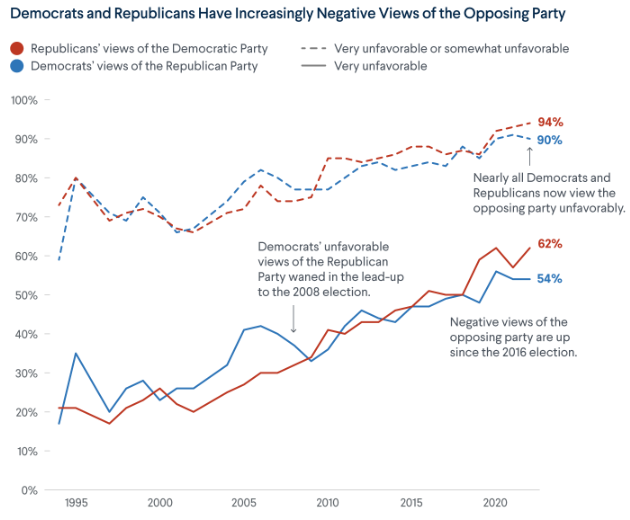Why is politics so intimidating to talk about nowadays?
June 2, 2023
The “United” in “The United States” has evolved into a strained and tentative term to describe the state of America in recent years. Political polarization, or the increase of extreme opinions and ideologies has rocked the political and social spheres of America’s population. The left and the right have totally diverged in not only opinions but the respect and willingness to participate in political discourse with the other side without taking personal offense.
Our rigid, two-party system appeals to our tribalistic instincts, an “us vs them” mentality, to such a point where 90% of voters believe that the other side winning an election would cause “lasting damage” to the country (according to Pew Research Center). Campaigning itself has become more aimed at breaking down the other side than highlighting what makes you a better candidate, “During the 1960 presidential campaign, only around 10 percent of political advertisements aired were negative; by 2012, only around 14 percent of campaign ads were positive.” (according to the University of California).
Is this problem existential for democracy in America or America overall? As the first advanced Western nation to experience polarization of this extreme level, the United States appears to be in unexplored waters.
America has seen this drastic uptick in hate and animosity towards each other for many different reasons. America is a gigantic powerhouse of a country, and many of the causes of this problem are broad patterns, and trends spread out across time. While we all can be blamed, a few culprits are especially responsible.
One of the main culprits is the capitalization of media. Polarization within media, whether that be social media or news sources, is encouraged, the more polarized you become, the more outrage and fear you stir up, and the more money to earn. Enormous corporations like CNN, Fox News, and MSNBC have become engineered machines to efficiently draw a reaction out of people, through sensationalization, intentionally politically slanted reporting, and the overall departure from the typical neutral journalistic method.
Many Americans consume media that agrees with them, a product of confirmation bias (according to another report by the Pew Research Center). Humans like it when their views are regurgitated back to them, therefore making news corporations’ strategy of swayed reporting an effective money-making strategy.
Social media is debatably even more harmful than traditional media. On top of the fact that misinformation spreads 70% quicker than the truth on Twitter (Science.org), a high level of intolerance for contrarian views is prevalent due to the anonymity and consequence-less nature of social media. Facebook and Twitter have a reputation for much of these party-pushing arguments, which the entire internet is intrinsically set up for. Social media corporations, just like those of their traditional media counterparts, have discovered that it is not meaningful political discourse that garners clicks and money, but fights and anger.
In confronting such a great virus as America’s political polarization, we as PA students and staff should retrain our brains to be able to talk about politics. Firstly, diversify your sources. Watch, listen, and read mainly fact-driven, devoid-of-opinion news, but change up the people you get opinions from. Don’t just listen to sources that you agree with, but all different perspectives.
By seeking out reasonable voices on the other side and respectfully hearing them out, we can gain a deeper understanding of their perspectives. As Benjamin Franklin once said, “It is therefore that the older I grow, the more apt I am to doubt my own judgment, and to pay more respect to the judgment of others.”
It’s important to keep an open mind and be willing to consider ideas from all sides of the political spectrum. Blindly following one party and disregarding the opinions of others can be detrimental to our democracy. While not every idea from the other aisle is a good one, it’s important to evaluate ideas based on their own merit rather than solely on which party they come from.
Students and Staff of PA: help America by spreading humility and fairness in your judgment of others’ political opinions, and assist in keeping PA as a civil and courteous place
Front Photo Credit: Cfr.org




